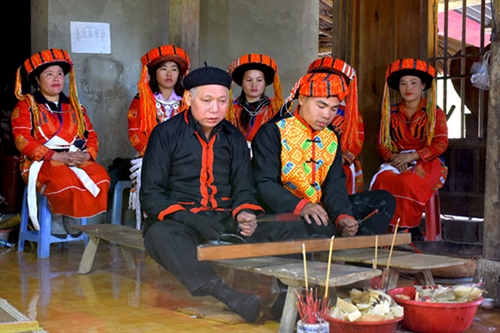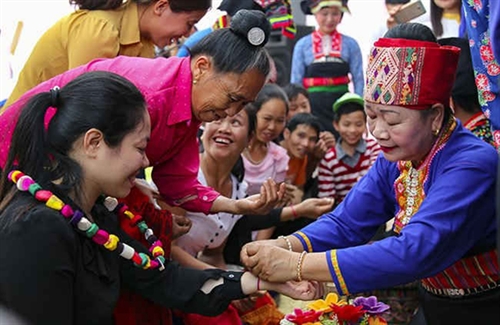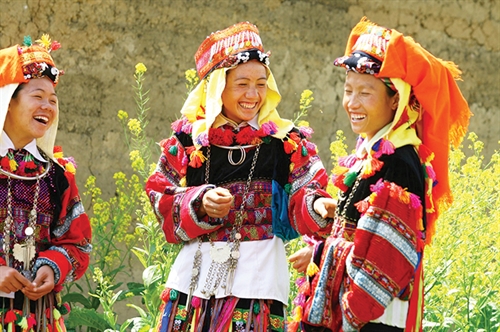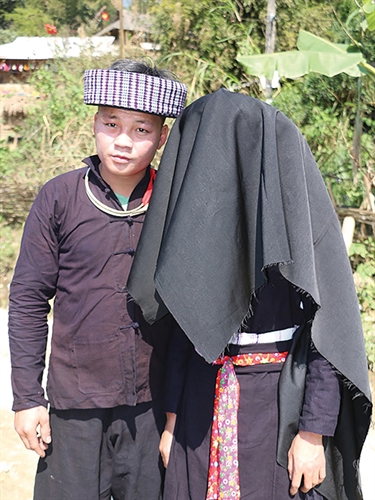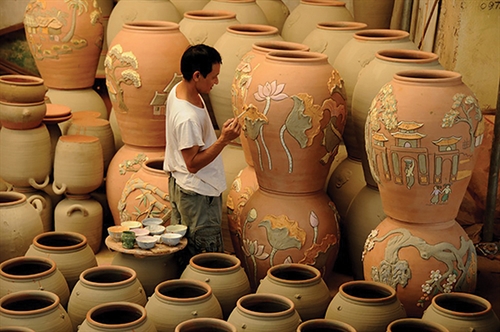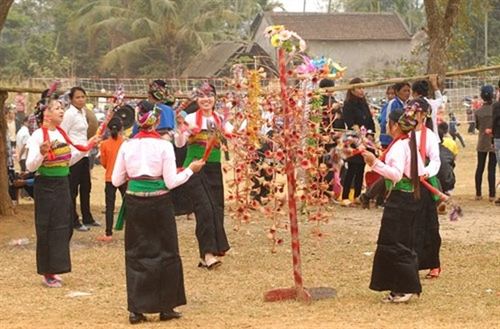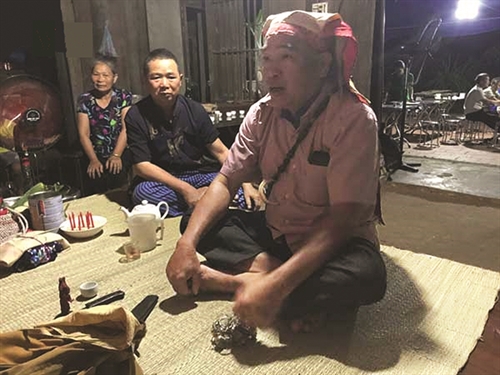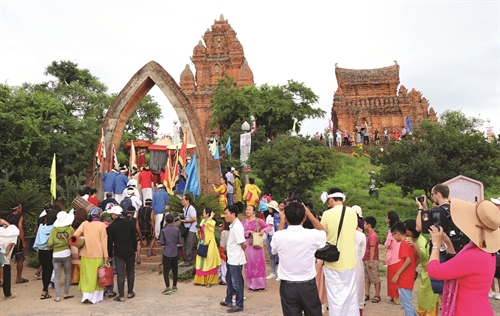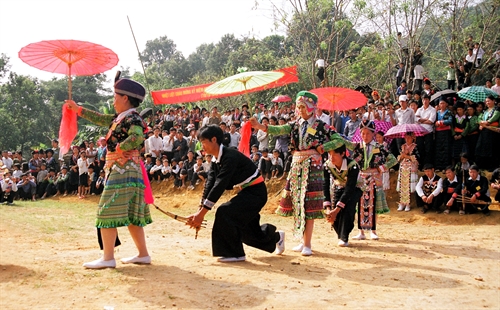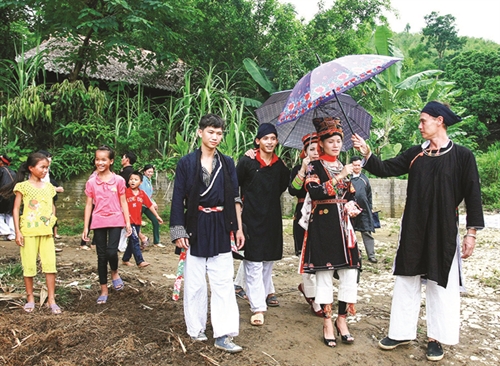Ta Thi Tam, M.A.
Institute of Anthropology
Vietnam Academy of Social Sciences
The worship of gods and goddesses, tutelary deities, and family ancestors plays a very important role in the spiritual life of the Dao Do (Red Dao), one of the Dao’s seven subgroups living mostly in the northern mountainous provinces of Lao Cai, Lai Chau and Cao Bang.
Chau Dang ceremony
The biggest and most scared rites of the Dao Do is Chau Dang, cloud-dragging ceremony, a ritual held at every family and community to express Dao Do people’s gratitude to deities and family ancestors. However, Chau Dang is not an annual or even decennial ceremony. At the family level, Chau Dang takes place only once in a lifetime while at the community level, the ceremony is held once in half a century. Every time when the ritual takes places, it is conducted in three consecutive years of which the most important part falls into the third year when a special ceremony is performed to honor Lin Chieu, the deity who, in the belief of the Dao Do, creates and looks after the land, plants and animals and, at the same time, protects human life.
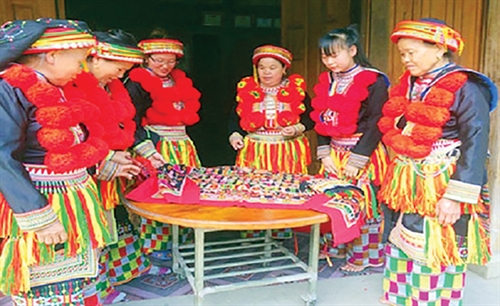 |
| Dao Do women in Lai Chau province in their traditional costumes__Photo: dantocmiennui.vn |
To prepare for Chau Dang ritual, villagers will choose a woman and four “virgin” couples to assist shamans during the ceremony. The woman will take charge of making banh day, a traditional round-shaped pastry made from sticky rice, while young couples will perform ritual dances.
Offerings to the Lin Chieu will be placed in three tables arranged next to each other horizontally underneath the altar to the shrine’s entrance door. A slaughtered pig will be put on the first table right under the altar. Meanwhile the remaining two tables are set with two trays each having three banh day, three banh chung, a square-shaped pastry made from sticky rice, green bean and pork, seven empty cups which will be filled with wine later, and one bowl of uncooked rice. The tables are decorated with colorful paper flowers.
After all preparations are made, the shamans perform ceremonials to inform Lin Chieu deity of the organization of Chau Dang ritual and then invite the deity attend to the ceremony and bless villagers with peace and happiness.
The special thing about Chau Dang ritual is that all prayers are not simply read aloud but performed as a song and dance act.
There are three songs used during Chau Dang ritual. The first song is called khoi giang that is sung to help Lin Chieu deity to freshen up and set off to attend the ceremony. The second song, called ria tan, aims to invite the deity to enjoy the offerings. The principal shaman sings and, at the same time, dances and pours wine into the cups placed on the offering trays. The last song, called giao hoa, describes the picking, arrangement and offering of flowers to Lin Chieu deity. While the shaman sings, the four young couples, standing in two parallel lines facing each other, dance to amuse the deity.
As soon as the songs finish, the shamans’ assistant brings a wood plank with a drum, a gong, a bell and, especially a bowl containing 12 types of bushmeat on it and invite two men, the cook and tray arranger, to sit next to two shamans on either side of the plank. The shamans then say their prayers, asking the cook and the tray arranger about the origin of the bushmeat used to prepare the dishes. After the cook and the tray arranger leave their seats, the shamans sing two songs about the life of a cook named Chau Chan and a tray arranger named Pai Pia, who both have unlucky fates. The third song tells the story of Lin Chieu deity, the fourth song describes the fruits offered to Lin Chieu. To end the ritual, the shamans sing the fifth song, praying for Lin Chieu’s protection and inviting the deity to return to the heaven. Finally, the assistants throw the plank out of the shrine.
Tutelary god worshiping rituals
Every Dao Do village has a shrine to worship its tutelary god. The shrine is usually built under a large tree in the center of the village. Tutelary god worshipping rituals are held twice every year at the beginning and the end of the year. The first ritual, called the spring ritual, is held to pray for luck and peace, while the year-end ritual, called the thanksgiving ritual, aims to show gratitude to the god.
Before the spring ritual, the village patriarch and villagers clean up the shrine, write prayer papers and prepare the offerings. Each family sends one man to the rite, bringing a rooster, a bottle of wine, three bunches of incense sticks and votive papers. Villagers offer a tray including a pig, a rooster, five cups, an incense burner, a bowl of water, a handful of rice, a yin and yang coin and an iron sword.
After the rite, the village head praises families’ good deeds and then villagers raise toasts to a lucky and peaceful year.
Family ancestor worship
Every year, Dao Do people conduct a ritual before the 15th day of the lunar seventh month to show gratitude and respect for its forefather Ban Vuong and family ancestors and pray for health, happiness and bumper crops.
Several days before the ritual, which is considered the most important one after the traditional lunar New Year festival, Dao Do families make two traditional dishes, banh gai, a black-colored pastry made of glutinous rice and some special leaves, and banh rom, sticky rice dumpling, for the ceremony.
Before the invited shaman comes to conduct the ritual, the family members get up early to clean the house, decorate the altar with five or seven red papers and prepare an offering tray with a pig head, if available, a boiled rooster, a bottle of wine, a bunch of votive papers, four pairs of banh gai, a bowl of water and five cups of wine.
The boiled rooster is placed in the middle to the left of the altar that worships Ban Vuong and family ancestors and surrounded by three pairs of banh gai. Meanwhile, a pair of banh gai and a bowl of water are put on the right of the altar that worships gods and wandering souls. During the ritual, the shaman says prayers inviting Ban Vuong and family ancestors first and then gods and wandering souls. He prays for the family’s health, happiness, favorable weather and bumper crops.
On the 15th day of the lunar seventh month, Dao Do families cook meals to invite relatives and friends to enjoy their dishes.-
